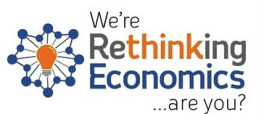From Lars Syll Economics has become a rather quaint and highly guarded discipline. We urgently need to update economics education to change this – because economics, as taught in universities, does not reflect or speak to many of the issues of the real world, be they political, environmental or social. Take the tricky entanglement between politics and economics, which economists tend to try to avoid. Such an attempt is futile. Sidelining politics, history and broader ideas while teaching economics, as most professors do, is like studying the “natural” flows of water in the Netherlands without taking into account that there are people living there who are steering it, building dikes, reclaiming land and channelling the water – and ignoring that they have been doing this for thousands of
Topics:
Lars Pålsson Syll considers the following as important: Uncategorized
This could be interesting, too:
tom writes The Ukraine war and Europe’s deepening march of folly
Stavros Mavroudeas writes CfP of Marxist Macroeconomic Modelling workgroup – 18th WAPE Forum, Istanbul August 6-8, 2025
Lars Pålsson Syll writes The pretence-of-knowledge syndrome
Dean Baker writes Crypto and Donald Trump’s strategic baseball card reserve
from Lars Syll
Economics has become a rather quaint and highly guarded discipline. We urgently need to update economics education to change this – because economics, as taught in universities, does not reflect or speak to many of the issues of the real world, be they political, environmental or social.
Take the tricky entanglement between politics and economics, which economists tend to try to avoid. Such an attempt is futile. Sidelining politics, history and broader ideas while teaching economics, as most professors do, is like studying the “natural” flows of water in the Netherlands without taking into account that there are people living there who are steering it, building dikes, reclaiming land and channelling the water – and ignoring that they have been doing this for thousands of years already. You can’t study the system while ignoring the people who make it …
Economists speak in numbers only, clinging to statistical data and quantitative models. We do so in the hope of looking objective. But this is counter-productive – “data” cannot tell us everything. Other social sciences such as sociology and anthropology use a broader range of methods, and consequently have a broader perspective on society …
Undergraduate economists all over the world learn theories from textbooks that have barely changed since the 1950s. Those theories are based on individual agents, competing in markets to maximise narrowly defined “economic utility” (for people) or profit (for firms). The principles are taught with the same certainty as Newtonian physics, and are as devoid of value judgements.
This is absurd. Clearly, there are values; mainstream economics values efficiency, markets and growth – and puts individuals over collectives. Yet undergraduates are not taught to recognise, let alone question, these values – and the consequences are serious.
A couple of years ago we could see the author in action in this must-see video:
Nowadays there is almost no place whatsoever in economics education for courses in the history of economic thought and economic methodology. This is deeply worrying. A science that doesn’t self-reflect and asks important methodological and science-theoretical questions about the own activity, is a science in dire straits. How did we end up in this sad state?
Already back in 1991, a commission chaired by Anne Krueger and including people like Kenneth Arrow, Edward Leamer, and Joseph Stiglitz, reported from own experience “that it is an underemphasis on the ‘linkages’ between tools, both theory and econometrics, and ‘real world problems’ that is the weakness of graduate education in economics,” and that both students and faculty sensed “the absence of facts, institutional information, data, real-world issues, applications, and policy problems.” And in conclusion, they wrote that “graduate programs may be turning out a generation with too many idiot savants skilled in technique but innocent of real economic issues.”
Not much is different today. Economics — and economics education — is still in dire need of a remake.
 More and more young economics students want to see a real change in economics and the way it’s taught. They want something other than the same old mainstream catechism. They don’t want to be force-fed with useless mainstream theories and models.
More and more young economics students want to see a real change in economics and the way it’s taught. They want something other than the same old mainstream catechism. They don’t want to be force-fed with useless mainstream theories and models.
